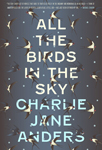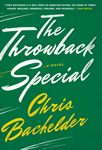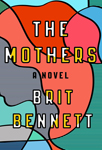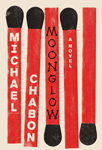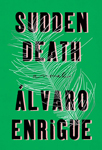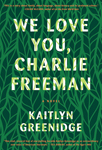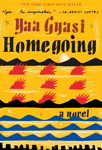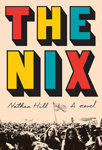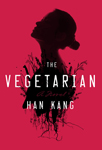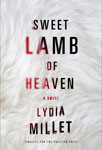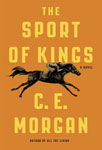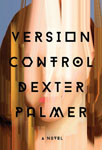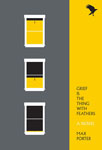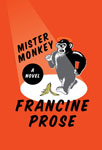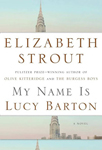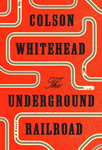by Charlie Jane Anders
Buy it at Powell’s »Aaron Bady: The frustration of Yaa Gyasi’s Homegoing is that this tightly wound book of short stories doesn’t develop like a novel. The single-word title and family-saga framework makes it feel like it should be a single, unified book—so we can call it a “novel” rather than a “collection”—but each episodic chapter is the last you’ll have with any character or setting: After two dozen pages investing in a story, the dramatic climax brings that episode to a conclusion, and then that’s the end of it. You become invested in the Ghanaian stories of half-sisters Effia and Esi—the one taken as a slave, the other married to a slave owner—and then suddenly the 18th-century narrative shifts forward to Quey and then Ness, their children, separated by the Atlantic Ocean, and by History with a capital H.
It never goes back, and we never circle back around to the characters we embraced in the novel’s opening pages. They are simply gone.
Perhaps this is the point: Each time, the next chapter is the next generation in the family saga, the next story, and then—inevitably—the next set of characters to be left behind. Tokens of the past might remain, and memories, and family stories. But for better or for worse, there is only forward in this novel, never back: Time is the door of no return.
The Nix more conventionally—and more comfortably—knits the strands of past and present together into a single narrative fabric, using flashback, confession, old letters, and—in a pinch—narrative omniscience to knot together a shaggy dog story about Swedish ghosts, a napalm factory, video games, the publishing industry, and abandonment. At the start of the novel, some surprising and apparently disconnected things happen (to characters whose connections to each other are not clear) but after 628 pages of pinballing between the touchstone years of 1968, 2004, and 2011—aka “American Protest Greatest Hits”—we discover, at last, that everything is connected. The pieces all fit together, the seemingly extraneous and indulgent tangents had a purpose after all, and in the mother-and-son ghost story we find the story of The American Present.
It is no small praise to say that The Nix sticks the landing, given how many bells and whistles Hill ties on to his tale. In an interview, Gyasi said she made sure to keep each chapter around 25 or 30 pages—and that she was never really tempted to break this rule—but there’s no such economy in The Nix’s logorrheic prose, which coils and spins at least three or four distinct novels into one singular story. Some work better than others: A publishing executive named Periwinkle is a hilariously genial Satan figure and his matter-of-fact corruption could have carried a novel on its own. In a radically different key, Faye’s humble desire for liberation in the rural Iowa of the 1960s is moving and powerful; if there’s nothing that original about it, Hill’s gentle, patient empathy does amazing things with a story I never thought I wanted to hear again. Of Laura Pottsdam, on the other hand, a plagiarizing cliché of a narcissistic college student, the less said the better; Hill’s portrait of The Millennials is barely original enough to be misogynistic, sort of what I imagine that Tom Wolfe novel about sororities is like (which I never read, because it sounds awful). And Pwnage, the great videogame addict, oh gentle Pwnage: a portrait of addiction so vivid and real—and apparently drawn from Nathan Hill’s own experience with World of Warcraft—that he takes over the narrative for far longer than the story could ever justify.
It’s a mess that somehow all comes together. And you keep reading, because well before the ending starts to bring some clarity to the story, Hill’s undeniable knack for constructing transitions and plot twists and satisfying middle-scale structure keep the story brisk and quick moving: each of the 10 sections of the novel feels sufficient unto itself, and each new revelation drives the narrative forward in new and interesting ways.
And yet—here’s the thing: I enjoyed every page of The Nix and I admire its craft like I do few authors’. But at its best, it still felt like a very well-done version of something I’ve read before, and sometimes many times before. I told someone that it’s a Thomas Pynchon novel written by Jonathan Franzen, but with a bit more humility and sense of humor, and I’m uncomfortable, frankly, with how satisfied I am with that description. It sounds like praise. And yet I can’t imagine wanting to read this novel again.
I think it’s the cynicism. For a novel so invested in political history, The Nix is curiously cynical about politics: A description of angry Chicago freeway drivers (“all their private traumas now publicly enlarged”) will do as a description of the political theory that animates it. What you think is ideology, or belief, or conviction, or revolutionary struggle, will in the end turn out to be just the desire of individuals to be loved (or their anger that they are not). If it has a moral, it’s that there’s nothing but private traumas: Vietnam protesters are not, it turns out, protesting against the war in Vietnam, but merely playing out personal, private dramas of loss and love. The same with Occupy Wall Street protesters, or anti-war protesters in 2004, and presumably with everyone else. “There is no such thing as society,” as the noted literary critic Margaret Thatcher once put it. “There are individual men and women, and there are families.” And that’s what you have to write novels about.
Homegoing is anything but cynical. And there is no novel in the world quite like it: Roots is maybe the closest equivalent, and like Alex Haley, Gyasi’s deep sincerity and will to tell a story a bit bigger than her archives sometimes produces anachronisms or a sentimentalism I find a bit too rich for my taste. But it’s not often you find a novel that dares to attempt to tell the full story: to tell the story of families split up by slavery and then, generation after generation, the story of that diaspora’s separation become permanent, as African and African American regard each other. Even Roots was not quite that big; it was really the story of Kunta Kinte—about losing him, remembering him, and finding him again—about melting slavery into the grand American narrative, one of many, pluribus unum.
Gyasi does something very different: By insisting on making American slavery an African story too—and on sidestepping patriarchal father figures in search of sister narratives and lost mothers—she tells a story I haven’t read before. She imagines lost worlds, and finds them.
Match Commentary
By Kevin Guilfoile & John Warner
Kevin Guilfoile: Genealogy is like the great white American hobby. For many white Americans, following their bloodline back to Ireland or Italy or Germany or wherever is cute and informative and relatively easy. Many African Americans can’t do that. So when Alex Haley claimed he did do it, and then told the story of his family going back to Africa where, by the way, his ancestor was kidnapped, brought to this country in chains and sold into slavery, and Kunte Kinte’s descendants were in turn sold and raped and suffered every other horror at the hands of white people while white people exclusively enjoyed the benefits of living in a nation on its way to becoming the world’s most prosperous, it was a transgressive act. Sentimental in parts, maybe, but still transgressive. He adopted this familiar, innocuous, Caucasian framework—tracing your “roots”—to tell a very different story from that of European immigrants, and I think that has the potential to change the way you and I perceive the journeys our families took before and since they came to America.
(By the way, I am aware of the various criticisms of Haley, and the charges that his story was not as historically accurate as he claimed, etc.)
Homegoing, to me, is a post-Roots novel. Gyasi is freed from having to make Haley’s point. Her story is not told in contrast to the European story. It is a story told on its own terms, with all the inherent joys and horrors. It does not require anyone else’s story as a reference point. And it’s told beautifully. Judge Bady says, “She imagines lost worlds, and finds them.” Wonderfully put.
John Warner: The mini-series of Roots, not unlike the Joe Theismann leg snap referenced in the play-in match’s The Throwback Special, was a seminal television experience for people of our vintage. I won’t rehash a bunch of stuff we know about our fractured culture, but it really was a show that a significant portion of America watched—in fact, more than half of the US population at the time.
That ur-narrative of Roots opened the space for these other stories that complicate and enhance our understanding of these things. Most of the historical narratives many of us carry around are woefully incomplete. Old narratives can be enhanced or even replaced by subsequent ones.
The narratives each of us carries around are different, depending on all kinds of things: age, place of birth, class, race, gender, everything. Art and literature are, for me, the single greatest vehicle for transcending the limitations of my gaze based in those things. It’s not just that books can tell me things I didn’t know. They can reveal to me aspects of the human experience that I couldn’t feel. We call that empathy, and once it is engaged, it is difficult to undo, thank god.
I enjoyed The Nix because, for a time, it let me believe that humankind may not be as awful as I know us to be. It is an affirming novel without being cloying or cheap. That’s a tough balance, which is why I have some serious fondness for the book and recommend it all the time.
But even though my life experience is more attuned with the WMFUN (White Male Fuck-Up Novel) that The Nix represents, reading Homegoing made me feel like I was experiencing something more true, for lack of a better word—and who needs a better word, because that one works pretty well.
Kevin: I enjoyed The Nix even more than Judge Bady, so I am even more inclined to overlook the minor blemishes. All novels are imperfect, and if we like a story we will say we like it in spite of its flaws, and if we don’t like a novel we will say we dislike it because of them (commenter No Doubt Neighbors put this very succinctly about her opinion of Francine Prose versus John’s). But most of the time, those particular missteps of craft don’t really inform our decision as much as we think. This is something that has become really clear to me in 13 years of the Rooster. Our appreciation (or not) of any work of fiction happens on a gut, emotional level. Our attempts to explain why we love or we hate a book are often just rationalizations. But we learn so much from the attempt to figure it out. The ToB is a lab where we try to define the connections between our hearts and our heads, and hopefully it makes us all better readers and writers.
As much as I loved The Nix, however, I would have advanced Homegoing, as well.
Before I make the final Zombie Round announcement, I’d like to go off-topic for just a second. You and I get to come out every year and reveal quite a bit about ourselves, but there are other people who are mostly behind the scenes at the ToB who do most of the work and nobody gets to learn much about them. There’s Nozlee, of course, who does an amazing job keeping this thing running. For anyone who missed it, she did a terrific Q&A with the Goodreads Rooster group last year about how this thing comes together.
Andrew and Rosecrans are the founders and editors of The Morning News, which is an incredible site. I hope people who come here each year for the ToB manage to poke around and see what a great destination TMN is the other 11 months of the year. Still, managing this site isn’t the only thing they do. Specifically, Rosecrans has a new novel coming out in June, The Last Kid Left. And right now his byline is on the current GQ cover story, a fantastic profile of Roger Federer. Go read it.
John: While not officially affiliated with the ToB, I’d like to give a shout-out to the brains (and hearts) behind the So Many Damn Books podcast (and frequent participants in the commentariat) Drew Broussard and Christopher Hermelin. Their show has become a must-listen during the tournament, and other times of year as well. The fellas are selling T-shirts to support the podcast (I bought one, very nice), and if you haven’t checked out what they’re up to already, I urge you to do so.
Kevin: OK, counting up the Zombie votes for the final time, we see that The Nix has indeed received enough support to move it into the Zombie Round. This means that tomorrow it will be back here to face The Underground Railroad, with the winner headed to the Rooster final. BuzzFeed Books editor Isaac Fitzgerald will render a verdict with Letters Bookshop owner Land Arnold weighing in with commentary. Then on Thursday Homegoing will have to make it past The Vegetarian in order to move on to the championship.
This means, sadly, that we say farewell to All the Birds in the Sky.



